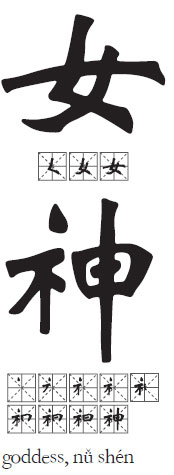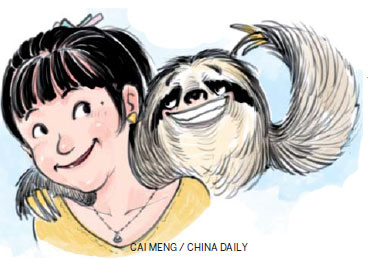In a word, this is me
Updated: 2016-10-21 07:12
By Ethan Yun(China Daily Europe)
|
|||||||||
The Chinese have a way of conveying your personality traits . . . whatever they may beThe Chinese have a way of conveying your personality traits . . . whatever they may be
First impressions can be tricky to navigate, especially in a new language. Maybe you should be super casual and make friends at the risk of oversharing. Or perhaps it's better to keep reserved and cultivate an air of mystery at the expense of seeming standoffish.
Alas, nothing is ever that simple, and greetings turn into a verbal war of attrition, leaving all participants brutally battered in the end.

Fortunately, in the Chinese language there are accepted norms. They concisely describe certain character traits, meaning you do not have to resort to long-winded explanations about how you "like to stay indoors, but not because you have no friends, but just because it is something you feel more comfortable doing".
Some are fairly general in their definition, while others have been direly overused - to the point where the meaning has been all but lost.
So the next time a meet-and-greet with strangers is on the horizon, equip yourself with one, two or even all of following phrases to knock those intros out of the park.
小鲜肉 (xiǎo xiān ròu)

Literally translated as "small fresh meat", this delightfully suggestive title is given to the males of the species when they are young, both mentally and physically.
These small fresh meats often behave in a way that will either make you gush at how cute they are or immediately wonder if you can see into your brain by rolling your eyes. Their (perceived) naivety and innocence will allow much leeway when it comes to social and professional etiquette.
萌妹子 (méng mèi zi)
You can think of this as the female version of 小鲜肉.
In fact, that is exactly what it is.
女汉子 (nǚ hàn zi)
And so we come to the first phrase that needs to be retired from the popular vernacular.
女汉子 is meant to convey a woman who regularly displays behavioral traits most commonly associated with males. This could mean anything from weightlifting to smoking. It is normally used in a positive light but, of course, there are many negative stereotypes.
Unfortunately for those of you looking to work this phrase into your next get-together, over the past few years 女汉子 has gained popularity and is now "trendy". This has resulted in an epidemic in which seemingly every woman has come to admit that they were closeted 女汉子s all along.
暖男 (nuǎn nán)
This phrase suffers from a similar problem as above and also shares many similarities with 小鲜肉. In the case here, 暖男 - which can be literally translated as "warm man" -the phrase came to prominence through Chinese enjoyment of South Korean drama.
The soft-spoken, vaguely feminine male character often tries his best to win over the female lead, but falls short at the very end. Despite losing to the guy at the top of the call sheet, these warm men have thoroughly won over Chinese audiences.
Many girls in China now strive for boyfriends that are 暖男. And when the buyers demand, the sellers supply.
男/女神 (nán / nǚ shén)
神 means god / deity, so right off the bat, you know it's serious.
It would be inadvisable to refer to yourself as a deity, for obvious reasons, but it can be freely utilized for a third party. In these cases, the meaning transforms to become "ideal".
So rather than saying that "she is a female god", you are conveying that "she is my ideal woman".
宅男 (zhái nán)
This phrase originated from the Chinese for otaku (御宅族 yù zhái zú) which describes the kind of person who is obsessed with mange, anime and video games. While 宅男 includes this demographic, its main purpose is to collect together all the people that like to stay home and give them a sense of belonging.
Although, these people could be of either gender, it is more commonly used to describe men - mostly because Chinese men are more likely to be anti-social in this way.
吃货 (chī huò)
Foodies. Love them or hate them, these specimens exist in our world to inform us that their love of nourishment is something to be admired and envied.
But, similar to some of the words previously introduced, foodies have become an overabundant resource in China. Somewhere along its timeline, the concept of food appreciation became a tool for people to ingratiate themselves to society.
I mean, who doesn't like foodies?

And so, what you see now are "foodies" who do not appreciate the taste, but only the price.
逗比 (dòu bī)
If you follow the Chinese entertainment industry - and you shouldn't-then you will know that, while celebrities may have a persona for work and events, they are all jokers when they're with their friends.
That's right, despite what we see on screens or hear in interviews, even the most stony-faced individuals spend their free time ghost-writing for comedians.
So in order to convincingly convey this to the public, the phrase 逗比 is often used. 逗 meaning "to tease" and 比 meaning … well … something risque. Use it as a verb or an adjective. Either will let people know how fun you can be.
Please note that as a 逗比, you will be expected to crack jokes and perform physical comedy at the drop of a hat, so be prepared.
Courtesy of The World of Chinese, www.theworldofchinese.com
The World of Chinese
(China Daily European Weekly 10/21/2016 page23)
Today's Top News
Lawmakers stage walkout to protest anti-China acts
Syrian army declares 3-day truce in Aleppo
BBC report on Terracotta Warriors refuted
Iraqi forces recapture more villages around Mosul
Greeks rally against labor reforms
Iraqi forces fighting all out to free Mosul from IS
Chinese pupils flock to UK independent schools
Britain's May, faced with turmoil, agrees to a debate
Hot Topics
Lunar probe , China growth forecasts, Emission rules get tougher, China seen through 'colored lens', International board,
Editor's Picks

|

|

|

|

|

|







